

Overseas Filipino Workers: The Modern-Day Heroes of the Philippines
Bayani is the Tagalog term for “hero.” In the Philippines, a bayani is someone who is courageous, humble, and selfless. They pursue causes that are greater than themselves, such as those impacting a community, a nation, or the environment. Overseas Filipino Workers (OFWs) is a term referring to Filipino migrant workers, individuals who have left their homes to work abroad and provide comfortable lives for their families. Referring to these workers, former President Corazon Aquino coined the phrase ‘Bagong-Bayani’ in 1988. OFWs are the country’s modern-day heroes because they not only boost the Philippines’ economy through remittances but are figures of resilience. OFWs endure homesickness, personal sacrifices, and horrible working conditions in order to support their families back home.
By the Numbers
The Philippine Statistic Authority estimates that about 1.83 million OFWs worked abroad from April to September 2021. The same data reveal that about “four in every ten” OFWs work low-status or ‘ elementary ’ jobs, such as street vendors, construction and factory workers, cleaners, domestic helpers, and agriculture laborers. A majority of OFWs work in Asia, specifically Saudi Arabia, United Arab Emirates, Hong Kong, Kuwait, Singapore, and Qatar.
Because of their major contribution to the growth and development of the Philippine economy, OFWs are revered as the nation's economic heroes. According to data released by the Central Bank of the Philippines, remittances from OFWs reached a record high in December of last year: from the previous all-time high of US$34.88 billion, it rose by 3.6 percent to a record high US$36.14 billion in 2022.
“OFW remittances, at new record highs on a monthly basis, are a bright spot for the Philippine economy in terms of spurring consumer spending, which accounts for at least 75 percent of the economy, and in turn, support faster economic growth,” Rizal Commercial Banking Corp. Chief economist Michael Ricafort said .
Furthermore, most OFWs are Filipina women. The numbers clearly show that women dominate the workforce, accounting for approximately 60 percent of OFWs. According to data from the Overseas Workers Welfare Administration, at least 18,002, or 75.05 percent of the 23,986 cases of abuse and other incidents involving workers in the Gulf Cooperation Council that were reported last year included female OFWs. On the other hand, male OFWs were involved in only 5,984 cases, or 24.95 percent of all cases.
These women are disproportionately more likely to suffer from terrible working conditions, as they are often subjected to abuse, excessive work, little pay, rape, or worse, being killed by their foreign employers. The International Labour Office published a working paper titled Philippines: Good Practices for the Protection of Filipino Women Migrant Workers in Vulnerable Jobs explaining that “Gender-based discrimination intersects with discrimination based on other forms of ‘otherness’ – such as non-national status, race, ethnicity, religion, economic status – placing women migrants in situations of double, triple or even fourfold discrimination, disadvantage or vulnerability to exploitation and abuse.”
In 2020, there were 23,714 documented cases of contract violations involving the maltreatment of OFWs, according to data provided by the Philippine Overseas Labor Offices, and approximately 5,000 of these cases were reported from Middle Eastern countries. According to the Philippine Information Agency, Filipina women who work in the Middle East are subjected to the “ kafala ” system, which ties foreign workers to their employers. Under this framework, employers could easily lock domestic workers inside their houses and seize their phones, passports, and visas until the expiration of their contracts.
The Human Rights Watch (HRW) published a comprehensive report titled “ ‘I Already Bought You’ Abuse and Exploitation of Female Migrant Domestic Workers in the United Arab Emirates,” which explains real-world examples of how the UAE’s kafala system of visa sponsorship binds migrant employees to their employers and how the exclusion of domestic workers from labor law protections exposes them to abuse.
The report included interviews with 99 female domestic workers in the UAE between November and December 2013. 22 of the 99 domestic helpers questioned by HRW claimed to have experienced physical abuse at the hands of their sponsors.
“They slap me in the face and kick me. They have a stick for you. If I make a small mistake they would hit parts of my body—back legs, back, and head. Sir would slap or punch me in the face. If they come back from the mall and I am not finished they would beat me,” Shelly A., a 30-year-old Filipina worker said. “They would say, ‘If you had done work then we won’t hit you.’ ”
Injustices in Kuwait
Currently, there are over 268,000 OFWs who live and work in Kuwait with 88 percent of them working as domestic helpers and 73 percent of them being female. According to the Philippine Department of Migrant Workers (DMW), there were over 24,000 cases of abuse and violation against OFWs in 2022—a significant rise from 6,500 in 2016.
It is a significant sacrifice to work abroad. Being physically and emotionally thousands of miles away from one’s family for an indefinite period is challenging, isolating, and suffocating. Rowena, a 54-year-old Filipina worker in Bahrain found herself feeling “trapped” due to canceled flights to the Philippines because of the COVID-19 pandemic as well as being underpaid by her employer. “I don’t want to make trouble. I want to go home,” Rowena said .
Beyond this, many OFWs also work abroad without knowledge of the future or the dangers they may encounter in a foreign country. Even worse, a harsh truth of working abroad is that a number of OFWs return home as dead bodies.
In January of 2023, Jullebee Ranara , a Filipina domestic helper living in Kuwait, confided in her family over the phone that she was terrified of her employer's 17-year-old son. The 35-year-old appeared to have vanished by the next day, which prompted her friends in the Gulf state to share their worries about her disappearance on social media.
Less than 24 hours later, on Jan. 21, 2023, her body was found dead, with burnt remains and a smashed skull found beside a desert near Al-Salmi Road.
Ranara was discovered to be pregnant after an autopsy, and DNA samples taken from the unborn child were confirmed to match the accused, who is the 17-year-old son of Ranara’s boss. After being apprehended, the 17-year-old perpetrator confessed to his crime.
Since 2018, there have been at least four murders of OFWs in Kuwait that have garnered national attention, including the case of 29-year-old Joanna Demafelis , whose body was kept secret in a freezer in an abandoned apartment for nearly two years. Her employers, a Syrian and a Lebanese couple, received death sentences for the murder of the victim.
In 2019, 47-year-old Constancia Lago Dayag was discovered dead after being sexually abused and beaten to death by her boss. The same year, 26-year-old Jeanelyn Villavende passed away from serious injuries inflicted by her boss, who was ultimately given a death sentence for the murder.
“These are only the high-profile ones,” Migrante International chairperson Joanna Concepcion told VICE World News. “There are other cases that are not visible. The public is not made aware of the real gravity of the rampant abuses faced by Filipino domestic helpers in Kuwait.”
Actions taken by the Philippine Government
A week after the discovery of Jullebee’s body, her remains were returned to her grieving family in Las Piñas, Philippines. Without delay, Philippine President Ferdinand “Bongbong” Marcos Jr. attended Jullebee’s wake and promised to provide the deceased’s family with all aid possible.
“I just wanted to offer my sympathies to the family and to assure them that all the assistance that they might need for the family and for whatever else, that is my promise to them,” Marcos Jr. remarked . “Their child made that sacrifice to work abroad because she has dreams for her family here.”
Recently, the DMW issued a deployment ban on new and aspiring OFWs in Kuwait, following the increasing reports of work mistreatment, including the horrific murder of Ranara.
“In order to strengthen the protection of the rights of Overseas Filipino Workers (OFWs) in Kuwait, particularly workers who are most vulnerable to abuse and exploitation, action on the applications of first-time agency-hire domestic workers bound for Kuwait is temporarily deferred effective immediately,” the DMWs said in a statement on Feb. 8, 2023.
Senator and Committee on Migrant Workers Chairperson Raffy Tulfo proposed a total deployment ban in Kuwait. “We can enter into bilateral agreements but our terms should be clear and unequivocal. If there are violators to such agreements, we have to prioritize the welfare of our overseas Filipino workers and act at the soonest possible time. Make these violators accountable and liable without concession and pursuant to our laws and international conventions,” Tulfo said in a senate inquiry.
The DMW was also tasked with working with the Department of Foreign Affairs to communicate to the Kuwaiti government the "sentiments and concerns" of the Filipino people regarding all recurrent incidents of physical and financial abuse, failure to pay monetary benefits, as well as murder committed against OFWs after the deployment ban went into effect.
The deployment ban was not well received by migrant advocacy groups, who claimed it would not provide a permanent solution to the issues surrounding labor migration. They claimed that placing bans for an extended period of time would encourage OFWs to turn to illicit means and consequently put themselves at risk for human trafficking in their desperation to find jobs abroad.
“What about the already-deployed Filipinos? Are there any steps being taken to protect them and make sure they do not suffer the same fate as Julleebee and the others?” Concepcion said to Maritime Fairtrade News. “These problems cannot be resolved with a deployment ban. The Philippine government has imposed bans many times before, but lifted them soon after when the particular cases of abuse or murder had been resolved by the courts and the perpetrators punished by death penalty or long-term imprisonment. When the deployment restarts, the abuses also start all over again.”
Much Needed Reform
OFWs often serve as the backbone of their families back home. Based on the results of a survey published by the Social Weather Stations , they found that 7 percent of Filipino households have an OFW who helps support the family. In addition, seventy-five percent of households frequently receive money from their OFW family members.
It would be difficult and inconsiderate to discourage or ban OFWs from going abroad for work. To promote a better quality of life for OFWs, the Philippine government must enact concrete policies aimed at protecting the welfare of Filipino workers. Advocacy groups, such as Migrante International are urging for reforms, including the abolition of the kafala system, which has resulted in complete employer control over domestic workers and OFWs.
For Concepcion, the country’s over-reliance on OFWs remittances is equivalent to the perpetuation of the violation and murder of Filipino workers. She believes that a viable solution to this issue involves ending the government’s labor export program and creating decent jobs domestically through meaningful land reform and national industrialization.
“The government’s determination to continue its labor export policy is totally misguided. What it should do is implement immediate measures to protect our domestic workers and OFWs abroad and long-term measures to generate decent jobs in the Philippines,” Concepcion said . “We need to end the government’s Labor Export Program and instead ensure that more jobs are created at home. Filipinos won’t have to leave the country and their families to risk their lives abroad if they have gainful and secure employment here.”
It is clear that OFWs live up to the definition of a bayani and are now considered heroes of the Philippines. However, under the shiny title of ‘bagong bayani’ lies a dark and unfortunate reality. Numerous Filipino workers suffer from various injustices including being overworked, underpaid, abused, raped, and even worse, murdered. The only way OFWs can truly be safeguarded is if the Philippine government enforces concrete and actionable policies. With this, OFWs could avoid the potential death sentence of working abroad and have the chance to be treated as they deserve to be: as modern-day heroes.
Laurinne Jamie Eugenio
Recent posts, the united states of europe and liberalism in the 21st century: interview with beate meinl-reisinger, chairwoman of austria’s neos party, a new vision for thailand: interview with pita limjaroenrat, member of the thai house of representatives and former leader of the move forward party.
Israel, Gaza, and Operation Swords of Iron: Interview with Sharren Haskel, Member of the Israeli Knesset
Medical Servitude: The Other Side of Cuban Medical Diplomacy
Remember Us: A Peek Into Childhood Autism in Ghana
You Might Be Interested In
Defying dictatorships: an interview with garry kasparov, on atlantic alliances and autocrats: an interview with jeanne shaheen, the artificial intelligence revolution in an unprepared world: china, the international stage, and the future of ai.
- SAUDI ARABIA

- OFW Profiles
- Transportation
- Money Remittance
- OFW Families
- Domestic Workers
- Philippine Government

OFWs experience different types of hardships – physical, mental, social, and emotional.
For a number of reasons, OFWs are considered modern-day heroes — if not martyrs — not only for their love for their families but more importantly, their significant contributions to the country’s economy.
Sana po may batas na magbibigay ng benepisyo sa mga OFW sakaling sila ay magretire na o makauwi ng bansa ng hidi inaasahan..marami kami mga ofw na tumanda na sa pagaabroad at madami din sa amin na umuwi ng luhaan o nabigo at pagdating ng pinas di na makahanap ng trabaho dahil sa katandaan…kung kami ay tinataw na modern herose..sana bigyang pansin kami pagdating ng araw.
Parang mali ang total figures po ng OFWs. Sa pagkaka-alam ko, parang lumagpas na tayo sa 8 million mark total OFWs sa buong mundo. Or baka naman sa 2012 deployment lang ang sinasabi nyo? I stand corrected of course.
As what was clearly describe on the written article, OFW contributed a lot to the Philippine Economic Growth… on the contrary, does the Philippine government have done something in return even in form of services?Instead, what we received from our government…..If you are a balik manggaawa (returning (OFW) you are bringing a 40 inches flat TV, the custom examiner will declare your baggage as taxable items and they will let you pay more than the original price of said items. Is the present government leaders are not aware of what was happening in their respective agency or they are just deaf and blind?Bato bato sa langit ang tamaan wag magagalit. Embassy natin sa labas ng bansa such as Qatar, walang sariling photo copier machine……May nakapost na working hours pero hindi naman sinusunod ng mga embassy employees…..Meron kunyaring pila pero kapag may kakilala ay hindi na pumipila at kapag nasita ay sila pa ang nagagalit! Yan ang klase ng mga employees natin sa government na mula nuon at hanggang ngayon ay nanatiling bulok at umaalingasaw na sistema.
Remittances provide financial liquidity to country. However, true economic progress based on the increase in the country production which is GDP. Remittances contributes to GNP which does not distinguish between qualitative improvements in the state and quantitative increase in goods . Virtually all other countries have adopted GDP as measure of true economic growth. Income of OFW are part of the GDP of the countries they worked. A genuine economic growth must came within our boundaries Government priority to increase production eventually income.
The OFWs sustain the countries economy therefore the Phil government should also protect those OFWs in their plight to sustain the living conditions of their respective families too.
salamat LORD at may OFW malaking tulong po tayo sa bansa natin at maiipag malaki . tayo po ang tunay na BAYABI . bawat isa sa atin kapag umalis na ng bansa natin LORD sayo po namin pinaoobaya ang lahat especialy ang familya namin , at ang papasukin naming bagong kapalaran sa labas ng bansa , kalamitan po sa aming mga OFW ay omuwe na ng may katandaan na . para lang sa pamilya , at ang masakit jan , sa loob ng maraming taon nayan , ang kalimitan sa mga OFW omuwe ng may mga karamdam dahil sa pagod at pangungulila sa familya ,, at pray ko po na bigyan ng pansin ng gobyerno natin na yong mga may katandaan na na omuwe ay bigyan nila ng award bilang ISANG TUNAY NA BAYANI , NG BANSA
LEAVE A REPLY Cancel reply
Log in to leave a comment
Latest Updates
Pinoy royal caribbean cruise staff allegedly installed hidden cameras in bathrooms, suspected of spying on guests, filipino nurse in melbourne suspended for stealing medical supplies and importing a skin-whitening medication, understanding pinoy films and why many of them are unwatchable, 12 money remittance tips for new ofws, comprehensive ielts guide for overseas filipino workers, more articles like this, 10 common ofw topics overseas filipinos talk mostly abroad, understanding infidelity among ofws and spouses, 5 values of ofws that make them subject to abuse, newsletter signup.
- Philippine Profile
- Balikbayan Boxes
- Filipino Seafarers
- Illegal Recruitment
- Pag-IBIG / HDMF
- Outstanding Filipinos
- New Zealand
© 2009 - 2022. Pinoy OFW | All rights reserved.
- How-To Guides
- Philippine Guides, Trivia, and Laws
- Filipino History, Culture, and Traditions
- About Homebased Pinoy
Understanding the OFW Phenomenon: A Closer Look at Overseas Filipino Workers
- by Amiel Pineda
- January 1, 2024 January 1, 2024

Have you ever considered the Overseas Filipino Workers (OFWs) as modern-day heroes?
Much like the resilient bamboo tree that sways with the winds but does not break, OFWs endure the challenges of working in foreign lands to support their families back home.
But beyond this metaphor lies a complex web of cultural, economic, and social dynamics that shape the OFW phenomenon.
From the reasons driving Filipinos to seek employment overseas to the impact of their absence on their loved ones, delving into this topic unveils a deeper understanding of the sacrifices and contributions of OFWs.
Key Takeaways
- OFWs play a crucial role in the economy and are considered heroes for their contributions.
- Challenges faced by OFWs include financial struggles, exploitative working conditions, and family separation issues.
- Legal and cultural barriers, such as restrictive immigration policies and discrimination, affect OFWs' experiences abroad.
- The government has established policies and agencies, like the POEA, to protect and support OFWs, but further oversight is needed.
Historical Overview of OFWs
During the Marcos years and continuing into the Cory Aquino administration, the phenomenon of Overseas Filipino Workers (OFWs) began to take shape, shaping a significant aspect of the Filipino cultural and economic landscape.
The term 'Overseas Filipino Workers' was coined to portray them as heroes, highlighting their crucial role in the country's economy.
The government's creation of the POEA (Philippine Overseas Employment Administration) to manage foreign labor migration was a pivotal development during this time .
Unlike the brain drain that existed previously, the OFW phenomenon differed in that most OFWs had fixed contracts and had to return to the Philippines .
Furthermore, the increase in the number of OFWs also contributed to the growth of remittances to the country, impacting not only the economy but also the social fabric of Filipino society.
This historical overview sheds light on the transformative impact of the OFW phenomenon.
Reasons for Working Abroad
The historical evolution of Overseas Filipino Workers (OFWs) during the Marcos and Aquino administrations has led to a complex interplay of economic needs, cultural dynamics, and social implications that drive Filipinos to seek employment abroad.
The reasons for working abroad are varied and compelling:
- Economic Opportunities : Industries like shipping and construction abroad provide better-paying jobs than what's available domestically.
- Government Response : The establishment of the Philippine Overseas Employment Administration (POEA) reflects the need to manage foreign labor migration.
- Temporary Solution : Overseas employment was initially seen as a temporary solution to the limited domestic job market.
- Financial Support : Remittances from OFWs sustain the consumption expenses of families left behind and contribute significantly to the nation's balance of payments.
These factors underscore the complex motivations and impact of working abroad for Filipinos.
Challenges Faced by OFWs
Working abroad as an OFW comes with its fair share of challenges. Financial struggles can be daunting, as you navigate through a different economic landscape.
Additionally, the separation from your family and the legal and cultural barriers you encounter can take a toll on your emotional well-being.
Financial Struggles Abroad
Amidst the challenges faced by Overseas Filipino Workers (OFWs), navigating financial struggles abroad becomes a daunting and complex task.
The realities of low wages, high living expenses, and volatile currency exchange rates create a precarious financial environment.
OFWs often encounter exploitative working conditions, excessive fees, and a lack of legal protection in their host countries, exacerbating their financial hardships.
Balancing the responsibility of supporting families back home while meeting their own financial needs adds another layer of complexity.
Furthermore, financial mismanagement, lack of financial literacy, and limited investment opportunities hinder OFWs' ability to secure their financial future.
The economic impact of the COVID-19 pandemic has further intensified these challenges, resulting in job losses and income instability for many OFWs.
Family Separation Issues
Navigating life as an Overseas Filipino Worker brings about the significant challenge of enduring prolonged separation from your loved ones. The absence of family support and connections often leads to homesickness and emotional distress.
For OFW families, the absence of parental guidance can impact the well-being of children, who miss out on emotional support and care. Additionally, the physical distance from families can make overseas workers vulnerable to exploitation and abuse.
The financial responsibility of supporting families while being physically separated can also lead to stress and mental health issues. These family separation issues highlight the emotional and psychological toll that OFWs and their families endure, emphasizing the need for support systems and resources to help them navigate the complexities of being apart while striving to provide for their loved ones.
Legal and Cultural Barriers
Encountering legal and cultural barriers in host countries presents significant challenges for Overseas Filipino Workers (OFWs), affecting their adaptation to new customs and work environments.
- Restrictive immigration policies and limited legal protection hinder the mobility and security of OFWs.
- Cultural differences and language barriers create obstacles in integrating into the host country's society and workplace.
- Discrimination and unequal treatment in the workplace adversely impact the well-being and work experience of OFWs.
- Limited access to legal assistance and support exposes OFWs to vulnerability, increasing the risk of exploitation and abuse.
These challenges often stem from the differences in labor export policies and cultural norms between the Philippines and the host countries, making it crucial for OFWs to navigate these barriers while striving for a sense of belonging and security.
Economic Contributions of OFWs
The economic contributions of Overseas Filipino Workers (OFWs) play a vital role in bolstering the Philippines' Gross National Income (GNI) and enhancing the nation's overall productivity.
The remittances from OFWs significantly contribute to the country's GNI, providing additional income to the nation's productivity. The increase in the number of OFWs has led to a steady growth in remittances, contributing to the nation's balance of payments and improving macro-fundamentals.
The Philippine Overseas Employment Administration has been instrumental in regulating and facilitating overseas employment, making it a crucial aspect of the nation's income and productivity.
Moreover, the opening up of the economy to foreign investors can create more job opportunities for Filipinos, leading to a more prosperous future for the Philippines .
The economic contributions of OFWs have a profound impact on the nation's economic landscape, reflecting the resilience and hard work of the Filipino workforce.
Impact on Families Left Behind
The separation caused by working abroad as an OFW impacts the emotional and social fabric of families left behind in the Philippines. This impact is complex and multi-faceted.
- The absence of a parent or spouse can lead to emotional strain and feelings of loneliness, especially during important family milestones and celebrations.
- The financial support from OFWs sustains the basic needs and expenses of the family, providing a better quality of life and access to education and healthcare.
- However, this absence can also lead to challenges such as absentee parenting, communication gaps, and a sense of disconnection within the family unit.
- Despite these challenges, the remittances sent home by OFWs contribute significantly to the overall economic stability and growth of the Philippines, creating a larger and more prosperous home community crucial for nation-building.
Government Policies and Agencies
Amidst the complexities surrounding the impact of overseas Filipino workers on their families left behind, the Philippine government has established crucial policies and agencies to oversee and regulate labor migration. The Philippine Overseas Employment Administration (POEA) plays a vital role in managing foreign labor migration, ensuring the welfare of Overseas Filipino Workers (OFWs). Additionally, the government has recognized the need for further oversight, leading to the creation of the Department of Migrant Workers, which is set to be operational by 2023. Despite the government's claim of not maintaining a labor export policy, agencies like POEA supervise labor recruitment and deployment agencies. This is essential to protect OFWs from mental health concerns, discrimination, and abusive workplaces. The establishment of these policies and agencies reflects the government's commitment to addressing the challenges faced by OFWs and ensuring their well-being.
Health and Well-being of OFWs
To understand the challenges and experiences of overseas Filipino workers (OFWs), it's important to delve into the intricate dynamics of their health and well-being while living and working abroad.
The health and well-being of OFWs are profoundly impacted by various factors such as the stress of separation from family, exposure to unsafe workplaces, and mental health concerns. Here's what affects their health and well-being:
- Stress of Living Abroad : OFWs often face the stress of adapting to a new culture and environment, which can take a toll on their mental and emotional well-being.
- Separation from Family : Being away from their loved ones can lead to feelings of loneliness, homesickness, and emotional distress.
- Unsafe Workplaces : Many OFWs work in environments where they may be exposed to hazardous conditions, affecting their physical health.
- Mental Health Concerns : Depression and workplace discrimination are prevalent among Filipino migrant workers, especially women, posing significant challenges to their overall well-being.
Frequently Asked Questions
What have you understood about the overseas filipino workers.
You understand the overseas Filipino workers' significant impact on the country's economy and society. Their remittances contribute to the nation's balance of payments, while their cultural integration and social support are vital for their well-being.
Has the OFW Phenomenon Impact on the Philippines Been Generally Positive?
Yes, the OFW phenomenon has had a generally positive impact on the Philippines. Their economic contribution through remittances sustains consumption and improves the nation's balance of payments, benefiting the overall economy.
What Are the Challenges Faced by Overseas Filipino Workers?
Living as an OFW, you face financial struggles due to high placement fees and unfair salary deductions. Additionally, cultural adjustment can be challenging, with language and integration barriers posing difficulties in foreign countries where you work.
Why Are There so Many Filipino Overseas Workers?
You're wondering why there are so many Filipino overseas workers. They go abroad for reasons like better economic opportunities and to support their families. This has economic and social implications for both the Philippines and the host countries.
You now have a deeper understanding of the OFW phenomenon, including its historical background, reasons for migration, economic contributions, and impact on families.
The challenges faced by OFWs and the policies and agencies in place to support them have also been highlighted.
By recognizing the sacrifices and contributions of OFWs, we can work towards improving their health and well-being, and addressing the issues they face while working abroad.
By providing an email address. I agree to the Terms of Use and acknowledge that I have read the Privacy Policy .
OFWs are heroes of PH economy
The success of a country is usually shown by its commitment to provide opportunities that allow its people to become productive members of society. For a relatively poor nation like ours with scarce and often misused resources, opportunities and good-paying jobs are severely limited. Our countrymen—waiters, welders, construction workers, teachers, drivers, accountants, doctors, etc.—are compelled to seek employment in other countries, where salaries/wages are lucrative, to the disadvantage of their loved ones left behind. Ironically, the labor and sacrifice of the overseas Filipino workers (OFWs) have also considerably improved the lives of our countrymen, and have brought some sense of economic security and well-being to our nation.
OFWs are indeed the country’s modern heroes. Their work overseas has greatly helped reduce poverty and played a major part in turning our once-lackluster financial system into the booming one it is today. OFW remittances have steadily increased to over $25 billion a year in the past several years. Because this money is sent to families of OFWs to buy mainly goods and services, it goes directly to businesses, leading to a corresponding increase in income in related sectors of the economy (the multiplier effect).
Regrettably, however, the allure of a “better life” overseas has also caused not only a drain on our country in terms of human skills, talents and potentials, but also the separation of families—in my opinion, a huge sacrifice for which no amount of money can compensate. In many cases, separation robs families of the chance to foster healthy relationships—the foundation of a healthy nation. And while majority of OFWs are fortunate to find joy and fulfillment overseas, a few are not so lucky and become victims of physical or sexual abuse by employers, or may even end up jailed or dead in foreign prisons.
Our government must continue to act with concern and urgency to address the plight of our OFWs and the unemployed. It must continue to improve the services to OFWs needing help, and aggressively pursue measures that spur economic growth on the home front to create more opportunities for our people. Thanks to our modern heroes—their labor and sacrifice have brought pride to our nation and have helped improve our economy.
Julius D. Turgano, [email protected]
Subscribe to our daily newsletter

Fearless views on the news
Disclaimer: Comments do not represent the views of INQUIRER.net. We reserve the right to exclude comments which are inconsistent with our editorial standards. FULL DISCLAIMER
© copyright 1997-2024 inquirer.net | all rights reserved.
We use cookies to ensure you get the best experience on our website. By continuing, you are agreeing to our use of cookies. To find out more, please click this link.
- Subscribe Now
OFWs as modern-day heroes: Seriously?
Already have Rappler+? Sign in to listen to groundbreaking journalism.
This is AI generated summarization, which may have errors. For context, always refer to the full article.

With over 10 million overseas Filipino workers (OFWs) as of the last official count, the Philippines has not only seen renewed discussion of national concerns, as the recent presidential election has shown. The country, more than ever, also faces transnational issues encountered daily by its own migrant workers.
The large voter turnout among overseas Filipinos, the highest at 31.45% after 2004, when the country first had overseas absentee voting, implies that the OFWs have finally spoken. Faced with all sorts of imaginable and unimaginable migratory experiences, beyond the votes that they cast, OFWs now want their voices to be heard.
Considered as the country’s modern-day economic heroes, OFWs have become beneficiaries of some of President Rodrigo Duterte’s orders to the bureaucracy, aimed at expediting processes and services specific to their needs. While this measure is deemed necessary, if only to streamline the day-to-day operations of government agencies catering to the sector, a closer examination of OFW-related concerns should go way beyond what has already become a part of a simple protocol.
As a major player in the global labor circuit, the Philippines continues to face a plethora of migrant work issues, including those that even previous administrations had struggled with. Some concerns are recurrent, such as drug smuggling and human trafficking, as exemplified by the case of Mary Jane Veloso . Others are emerging.
Zeroing in on measures designed to address OFW concerns, the new administration’s next best move may be carried out via a two-pronged approach. On one hand, it should study carefully the issues previously paired with relevant policies or polices that show a great potential for success yet are either not being implemented or poorly executed.
Touted worldwide as a labor-sending country that serves as a model due to its established programs and policies, the Philippines boasts of well thought-out plans whose implementation requires solid attention. Reinventing the wheel is not exactly a gainful exercise in this regard.
On the other hand, the new government should also look into issues brought about by trends, or newer situations that were deemed nonviable within the context of each of the previous administrations. This second approach promises a considerable number of opportunities for the current leadership to prove its worth, if it wishes to stay faithful to its campaign promises.
OFW issues relevant to this approach are those that are propelled by the changes of the times. As the propensity of the Filipinos to seek work abroad continues to grow, so do the issues that the government is expected to address.
Emerging destinations, emerging issues
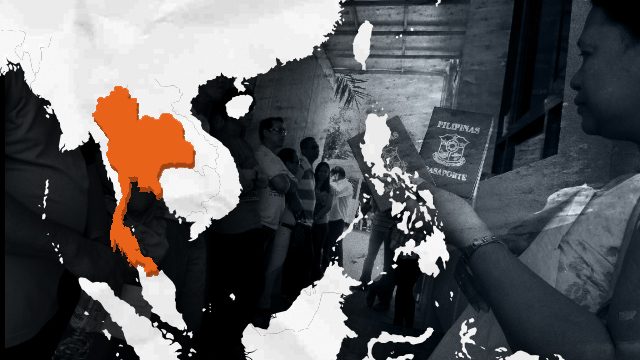
The number of emerging countries of destination continues to expand, and, as such, the needs of OFWs diversify as well. While some of these needs are already addressed and the corresponding policies are already established in top destinations such as Saudi Arabia, Singapore, Hong Kong, the Middle East, and Italy, among others, the same cannot be said of countries with a budding Filipino population.
In Thailand, for example, where there are an estimated 15,000 to 20,000 OFWs – with the teaching work force as the biggest occupational category – questions about the workers’ social and statutory protection run high.
During Prime Minister Prayut Chan-o-cha’s state visit to the Philippines, it was reported that while Thailand and the Philippines have an existing bilateral agreement, it does not cover the Filipino workers’ social and statutory needs. Instead, the bilateral agreement that is supposed to hedge said workers’ needs has been in the pipeline for years now.
As such, while the OFWs in Thailand continue to contribute to the Philippines’ economic growth through their remittances, they generally remain unprotected.
One form of protection many OFWs consider important is access to statutory benefits such as the Social Security System (SSS) and PhilHealth, the country’s national insurance program. But in the case of emerging destinations with a small Filipino population, the portability of these programs which would give them access within the host country may, at times, not just be possible.
While a good number of employers provide medical insurance to its foreign personnel, the coverage is often limited, forcing an OFW to shoulder the extra expense. This, of course, is just one of the many limitations OFWs experience in their host country.
Given Duterte’s orders that directly impact OFWs and with Foreign Secretary Perfecto Yasay Jr’s statement calling the Filipino overseas workers as the country’s “economic heroes,” shouldn’t it be high time that the government reciprocate the contributions of Filipino migrant workers in more tangible ways? – Rappler.com
Analiza Perez-Amurao is a senior lecturer and assistant program director in Mahidol University International College in Thailand. A PhD candidate, her research examines the migratory experience of Filipino educators in the Kingdom by looking through the lenses of the politics of English language education. Funded by SEASREP, Toyota Foundation and Japan Foundation, she presented her preliminary findings in the University of Gadjah Mada, Indonesia late last year. Visit her online page , or follow her @analiza_amurao.
Add a comment
Please abide by Rappler's commenting guidelines .
There are no comments yet. Add your comment to start the conversation.
How does this make you feel?
Related Topics
Recommended stories, {{ item.sitename }}, {{ item.title }}.
Checking your Rappler+ subscription...
Upgrade to Rappler+ for exclusive content and unlimited access.
Why is it important to subscribe? Learn more
You are subscribed to Rappler+

Home > SIT Graduate Institute > Capstone Collection > 1658
Capstone Collection
The overseas filipino workers’ (ofw) identity: local modern day heroes or global servants.
Ma. Victoria C. Garcia , School for International Training
Degree Name
MA in International and Intercultural Management
First Advisor
Martha Merrill
Migration has become a common demographic response of Filipinos to various socio-economic problems. In the light of the severe economic crisis that has confronted the country in recent years, the Philippines has become a major source for international migrants and become one of the largest sending countries of labor to various countries in the world. The Filipino workers, both women and men, leave the country in order to earn a sustainable income, a condition that is difficult or inadequate in their own country. This research investigated if OFWs perceived themselves within the context of the social labels “local modern day heroes” or “global servants”. Do these labels affect their personal, family or social life?
In this paper, the author used the grounded theory research method to formulate a theory concerning the perception of the identity of OFWs: a local hero or a global servant. The author conducted an on-line survey of OFW men and women who have been deployed since 2001 in one of five countries: Canada, Italy, Hong Kong, Taiwan and Saudi Arabia.
The three most important findings of this research were the following:
Globalization has created a new reality for OFWs, there has been a feminization of Philippine migration and OFWs have based their identity on what they can do for their family. OFWs know who they are and do not care how others perceived them. Because of the importance the OFWs place on the welfare and well-being of their families, labels are of little significance to them.
- Disciplines
International and Intercultural Communication | Sociology of Culture
Recommended Citation
Garcia, Ma. Victoria C., "The Overseas Filipino Workers’ (OFW) Identity: Local Modern Day Heroes or Global Servants?" (2004). Capstone Collection . 1658. https://digitalcollections.sit.edu/capstones/1658
This document is currently not available here.
Since November 19, 2010
Advanced Search
- Notify me via email or RSS
SelectedWorks
- Login Page for SelectedWorks
- Collections
Author Corner
- Submission Guidelines
- Submit Research
- SIT Graduate Institute
Paper Locations
- View Papers on map
- View Papers in Google Earth
Home | About | FAQ | My Account | Accessibility Statement
Privacy Copyright
9 Reasons OFWs are Tagged as Modern-Day Heroes
Migrant Filipino workers have been regarded as modern-day heroes since the start of the century, when more and more Filipinos started moving out of the country to work . The martyr-like display of love manifested by their intense desire to improve the lifestyle of the entire family despite the lonely nights in a foreign land is nothing if not admirable.
Many people may argue about them being heroic but no one can deny that the aspirations for a better life is what sends these Filipinos out. Along with it comes a number of positive change for the rest of the country.
One such negative comment about OFWs posted on social media prompted a Twitter user to react and another one to rush to the defense of OFWs in general.
Ang tindi ng tama ng pinagbabawal na gamot sa taong ito. No more hope for this one. Ulalong ulalo na.?? pic.twitter.com/mLb4OZXwQL — twilight (@rene_twilight) October 20, 2019
The original post which was made by someone on Facebook registered as Geoof Blanco reads, “OFW mga hero daw?? Pano naging hero yan mga yan e para lag sa sarili nila sahod nila samantalang kami para sa bayan silbi namin..”
The post, which many found offensive, also tagged the migrant workers as “patay-gutom” which invited more support for the migrant workers.
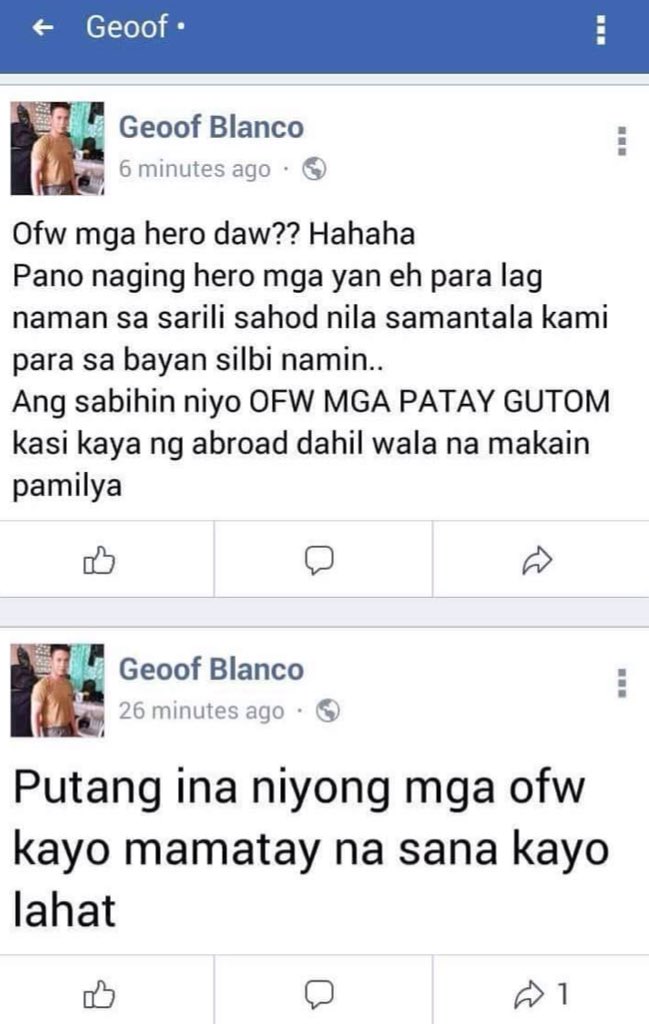
Another Twitter user,an OFW himself who is based in Thailand and uses the handle @eMCee_sadt went on and listed what he believes to be the reason for the migrant workers’ ‘hero’ title.
As af as I can remember during my college days… A thread!
1. OFWs are modern day heroes because they contribute to the country’s GDP by about 10% through money remittances. https://t.co/mqTPKUnaDw
— ? eMmmmm ? (@eMCee_sadt) October 21, 2019
2. GDP- growth domestic product. Gross Domestic Product (GDP) is the total monetary or market value of all the finished goods and services produced within a country’s borders in a specific time period.
(Investopedia)
3. OFW remittances contribute to our GDP as an investment. The law of Supply and Demand of money currencies will be at play.
4. OFWs are critical assets of the country. Why? We don’t export much like we used to, we don’t have the latest technologies, we don’t have much gold reserves, we don’t have the most patriotic citizens.
But we are the human resources powerhouse of the world.
5. We supply human resources around the world. Kahit libutin nyo pa ang earth, may pinoy na babati sa iyo.
6. We are known and well respected around the world because OFWs perform well compared to other countries. We get the job done. We have patience and sense of professionalism. We are honest and respectful.
7. Other countries have technological superiorities, bountiful natural resources and precious metals but without human resources, these things cannot be utilized.
8. Di kasalan ng OFWs kung kulang ang trabaho sa Pinas, mababa ang pasahod vs cost of living, too much red tape and palakasan. Di masama ang maghangad ng mas makakabuti para sa pamilya at sarili.
9. Di kami maghihintay na mamatay kami sa gutom o ubusin ang panahon kaka reklamo pero wala namang ginagawa para sa bayan.
No reply was posted but if only for these reasons, OFWs deserve respect. Nobody has to sing their praises but the least that we all can do for these modern-day heroes is to acknowledge the hardship – be it physical, mental, social, or emotional – that they had to go through as they live without their families in a foreign land.
Leave a Comment Cancel reply
You must be logged in to post a comment.

All about OFWs (Overseas Filipino Workers) aka Modern Day Heroes
The term OFW is an acronym for “ overseas Filipino worker ”, or Filipinos who opted to go to another country for employment. But like Filipinos who work in the Philippines, OFWs are also entitled to the same rights and responsibilities as members of the workforce. They also pay taxes to the Philippine government, and their remittances make up a significant part of our national economy.
The Department of Migrant Workers has been tasked to take care of the welfare of Filipino migrant workers abroad. Why is there a specific department for OFWs? It’s because our OFWs are prone to abuse and exploitation by their employers, and the Philippine government wants to make sure that they are protected.
The most common jobs that OFWs have are domestic work, construction, manufacturing, agriculture, and shipbuilding. They usually work in countries like Saudi Arabia, United Arab Emirates, Qatar, Kuwait, Hong Kong, United States, etc.
Table of Contents

OFWs as Modern Day Heroes
In a report by the Philippine Statistics Authority (PSA) published on March 7, 2022, there is an estimate of 1.77 million Filipinos working abroad from April to September of 2020. From this number, a whopping 96.4% or about 1.77 million are overseas contract workers, or those with active employment contracts.
The remaining 3.6% are Filipinos who are working abroad albeit with a different legal document such as a tourist, student, medical, or visitor visa, or any other non-working or non-immigrant permit. The total remittance sent by OFWs during this period amounted to over ₱134 billion, which came in a combination of in-kind cash sent to the country, and cash brought home.
OFWs are often coined as the “ modern day heroes ” for their sacrifices have always been valued, not only by the families they left behind, but also by the country they have always gone home to. Besides their immense contribution to our economy, OFWs contribute to the growth of Filipino culture worldwide, building communities of their own in order to foster the same feeling of home that they have been missing while working abroad.
We also hear of OFWs who have gone or are experiencing abuse and mistreatment in their countries of employment, and while the Philippine government maintains their stand on protecting our countrymen wherever they may be, some still brace such sacrifice simply in order to continue providing their families in the Philippines with a better future.
Why Filipinos Apply for Work Abroad
The Philippines is among the world’s places with the most number of migrant workers, and there can be a lot of reasons for these, but these reasons are often interrelated and interdependent of each other.
1. Better career opportunities
This is probably the most common reason you would hear from other Filipinos who wish to work abroad, and it’s no secret that greener pastures do lie in other countries than here in the country.
The idea of a bigger salary alone is convincing enough for many Filipinos to take the risk of living away from their loved ones. Moreover, overseas jobs allow for Filipinos to renew and explore themselves as skilled workers, as most job offers are contractual.
Although, of course, the ideal is to be a regular employee, the fact that you can renew your contract every time it ends is a benefit of its own, and the liberty to either continue the path you chose or pursue another is in your hands.
2. Reasonable compensation
Many job offers abroad also come with better benefits and more reasonable and fitting qualifications. Therefore, Filipinos need not to worry about accomplishing so much paperwork when they know what they’re applying for in the first place, and its long-term effect is twofold: it fulfills their sole purpose of going abroad, and it also helps boost their morale, even with white-collar jobs. The idea is that when you are valued as an employee, the company sees the significance of your contributions and appreciates your presence, therefore making you value your job.
3. Good work experience
Working abroad provides Filipinos with a new environment with people and practices that may be far from what they know, which therefore allows them to explore their job more and gain significant experience that they wouldn’t normally get as a worker in the Philippines.
And should they come back for another career in the country, having an overseas work experience in their resume would give them the edge they would need for better compensation locally.
4. A chance for residence abroad
Another common plan for FIlipinos is to work abroad for a few years or until they can be their own sponsor and bring their families to live with them. This is because the longer you work in a foreign country, the higher your chance to be approved as a resident should you apply for one, especially when the country of employment sees your significant contribution and good moral standing.
It can also be a privilege for OFWs to get residence in their country of employment as it is easier to travel in an out of the country with such document. And on top of that, getting to experience the greener pasture with your beneficiary sure is worth the hard work.
5. Local and international benefits
OFWs are entitled to local benefits from government agencies such as OWWA, should they become members. They are also entitled to various international benefits as set by their employer, recruitment agency, and the government of their country of employment, should they become residents.
These benefits may come in the form of financial assistance for educational, livelihood, medical or other purposes, and they may be claimed for either their own benefit or for the benefit of their dependents in the country.
6. Better savings
Last but not the least, the saying “You reap what you sow.” applies well for most OFWs, because better paying jobs would mean they can establish better means of saving up money, and they can actually save up more.
Whatever they save up from years of working would be the fruit that they can send or bring with them home for a better life—with their investment returned.
Considerations in becoming an OFW
Many Filipinos who become OFWs enjoy a number of benefits in a variety of settings. Some of these benefits are useful in their everyday life in a foreign country, while some of them benefit their loved ones back home. However, the mere thought of working far from home is a huge risk, and a responsibility in itself.
Working overseas would be a whole new world, especially for first time migrant workers, and the necessary adjustments will either make or break your supposedly new chapter of life.
So it pays to weigh the pros and cons of working abroad depending on your resources, current overall condition, capabilities as an individual, and the consent of your loved ones (before you leave them for a long time!)
1. Language
Being bilingual (or even multilingual) is an advantage for most jobs here and abroad, because it actually allows for us to break language barriers and communicate with more people. This is a very useful skill especially when you are dealing with foreign clients.
On the other hand, it can also be a hassle for some who are not used to communicating in more than one language. It can also be an extra challenge, especially when you are already an adult and you’d have to pay to take formal language lessons.
And take note that world languages are constantly evolving, meaning you’d need consistency in using the language for you to actually learn it and use it appropriately at work.
As we’ve mentioned earlier, moving abroad will entail a cycle of adjustments, including culture shock, as well as the occasional homesickness, separation anxiety, and feelings of instability. While this is normal for everyone who’s going out of their comfort zones, it can be detrimental to one’s overall well-being, therefore affecting their performance at work. There will also be times where you will feel alone and discriminated against, and these feelings are all valid.
But on the flipside, working abroad provides opportunities to get to know and be familiar with people in other parts of the world. There is no better tip on cultural awareness than being immersed in the culture itself. It can be grueling—embarrassing at some point—but it is definitely worth the time and effort when you get to discover more of yourself in the process. And should you need protection or extra guidance, the Philippine consulates, embassies, and overseas offices are ready and willing to help you adjust.
3. Conflicts with personal life
Working abroad would mean having to establish yourself again, but this time, as part of a whole new community. Feelings of isolation and anxiety will come, and there will be times where it will be hard to talk to your loved ones back home—may it be because of time differences, conflicts with your work schedule, or simply because you don’t feel like it—and again, these are all normal.
Conflicts with personal life and interests are part of the adjustments that OFWs need to face when working abroad, but they can prepare for this beforehand through pre-deployment orientation seminars and training workshops organized by the Philippine government through OWWA, or accredited manning agencies by the Philippine government. Also, picking up new hobbies, interests, and building new routines make for an effective adjustment to the new community you are growing and working in.
4. Struggles at Work
Being an OFW is not as glamorous as it seems. We’ve heard of success stories from some of them, but many of them had to go through hardships, and some still endure them.
Maintaining a clean and agreeable reputation at work takes a lot of time, and it can be a real issue given the uncertainties in foreign territory. Abuse, maltreatment, and discrimination are only some of the major issues that many OFWs continue to face.
On top of that, OFWs had to adjust to the uncertainties of their working environments and other harsh conditions. These struggles contribute to the buildup of stress that they might be facing as lone individuals far from home.
However, the Philippine government, through its overseas agencies and partners, consistently reassure OFWs of their security and the protection of their rights and welfare as they strive to build a career abroad.
How a Filipino Can Become an OFW
In order for a Filipino to become an OFW, it is important to take note of the following steps and guidelines:
1. Know which job you are most suited for, given your knowledge, skills, and experience.
A lot of online and in-person job fairs offer various jobs abroad. Government offices such as the Philippine Overseas Employment Administration (POEA) also announce job openings abroad, in cooperation with different accredited manning agencies, , so be sure to keep yourselves posted for updates.
2. Be familiar with the different Philippine overseas offices
The next step is to be familiar with the different government offices that are tasked to facilitate, monitor, assist, and evaluate the activity of OFWs going in and out of the country. Some of these include:
- Department of Labor and Employment (DOLE)
- Overseas Workers Welfare Administration (OWWA)
- Commission of Filipinos Overseas (CFO)
- Philippine embassies, consulate offices, and overseas labor offices worldwide
- Philippine Health Insurance Corp. (PhilHealth)
- Social Security System (SSS)
- Home Development Mutual Fund (PAG-IBIG)
3. Know and comply with the application procedures and requirements
The third (and the longest) step is to know and comply with the application procedures and requirements, which may vary from one job to another. Generally, applying for an overseas job would entail the following:
- Attending pre-employment and pre-deployment seminars
- Accomplishing documentary requirements such as forms, statements and certificates,
- Completing interviews, medical and screening exams, and
- Signing of contracts
These procedures may or may not require a fee, and will take from a couple of hours to even weeks. The application process will cost you the most time, money and energy, which you will have to prepare for when applying for an overseas job.
4. Validation
Upon submission and accomplishing the application process, you will be allowed to proceed to your validation. Present your receipt and supplementing documents to the Bureau of Immigration before you can head onto the plane or ship for your travel.
5. Get acquainted once you land
Last but not the least, upon arrival in your country of employment, it is important to acquaint yourself with the community as best as you can. Navigate around, immerse yourself with the locals, and get to know the Philippine offices you can contact. You can also contact your employer prior to starting your work in order to be oriented on your payroll system and other benefits.
Frequently Asked Questions
Check out these common questions about overseas Filipino workers.
1. Is the OFW a new term? How long have there been OFWs?
OFWs have been going on since the early 70s! Many of them, however, have chosen the path of an OFW primarily due to the lack of employment opportunities in the country back then.
2. Why do Filipinos choose to work abroad?
Besides the reasons we have mentioned in the first part of this article, we believe the primary motivation for Filipinos choosing to work abroad is their being family-oriented. Many Filipinos would sacrifice a lot for their loved ones to thrive. Providing a better future for their families by saving up more money to send home is a common manifestation of this trait.
3. Are OFWs same with migrant workers? Do they have a difference?
There is no particular difference between the two terms, for they both mean the same. Migrant workers refer to people who move to another country for employment. OFWs are simply another term, if not more specific to Filipinos, for the same group of people. Although, in the recently created Department of Migrant Workers, the term “migrant workers” was used in place of OFWs.
4. Which countries have the most number of OFWs?
Top destinations for OFWs differ according to the type of work that is in demand. In a report by the Philippine Statistics Authority in March 2022, OFWs based in Asia comprise 83.6% of the total number of OFWs from April to September 2020. Among these, Saudi Arabia ranked first in the most number of OFWs, followed by the United Arab Emirates, Kuwait, Hongkong, Qatar, Singapore, and other Asian countries.
In conclusion, going abroad in hopes of a better life is a common picture for many Filipinos, despite the risks it may pose. They believe that it is the best way for their families to continue living in a country with unequal opportunities brought about by the growing class divide.
Being in a third world country means taking every chance at alleviating the hardships that your loved ones are facing, and this might be the closest reason to why they are dubbed the modern day heroes—offering their lives for a more prosperous future.
Leave a Comment Cancel reply
Save my name, email, and website in this browser for the next time I comment.
- DISCOVER GOLDEN HAVEN
- CHAPELS & CREMATORIUM
- VIRTUAL TOURS
- eNEWSLETTER
- JOB OPENING
- GOLDEN HAVEN AMBASSADORS
- SELLER’S ACCREDITATION
- KABAYAN REWARDS
- RESERVE NOW
- SCHEDULE AN APPOINTMENT
- ADMIN SERVICES
- UPDATE YOUR INFO
- EMPLOYEE’S CORNER
- SEND AN INQUIRY
- SHARE YOUR FEEDBACK
- SCHEDULE A VISIT
- SET AN APPOINTMENT
- SUBMIT LAND PROPOSAL
Reset Password

Honoring our Modern Day Heroes this Labor Day
Honoring our modern-day heroes this labor day 2021 . The past few months have been filled with tragedy. In the midst of these hardships and sacrifices, let us pause for one day to revel and honor our modern-day heroes in this year’s Labor Day. Who are those whom we call real-life heroes? Let’s recognize and identify the people who have made, and are making, a difference in their communities or the world.
“Balikbayans” or Overseas Filipino Workers
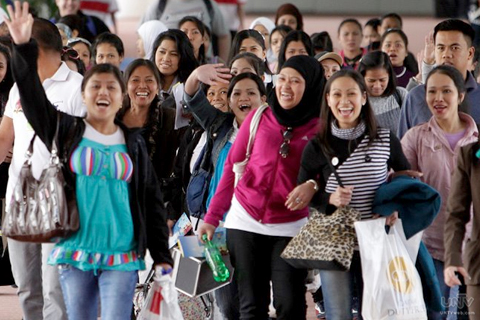
First, the Overseas Filipino Workers (OFW). Not only do OFWs face various forms of hardships while working abroad, but they also help a lot in sustaining the Philippines’ economy. They are keeping the country’s economy afloat through remittances that provide a better future for their family. According to the Philippine Statistics Association of the Philippines, the number of OFWs working abroad at any time during the period April to September 2019 is at 2.2 million.
OFWs deserve every ounce of our respect for the sacrifices they’ve made and the hardships they’ve endured. So let us salute them for the heroes and martyrs they truly are.
Health Care Workers
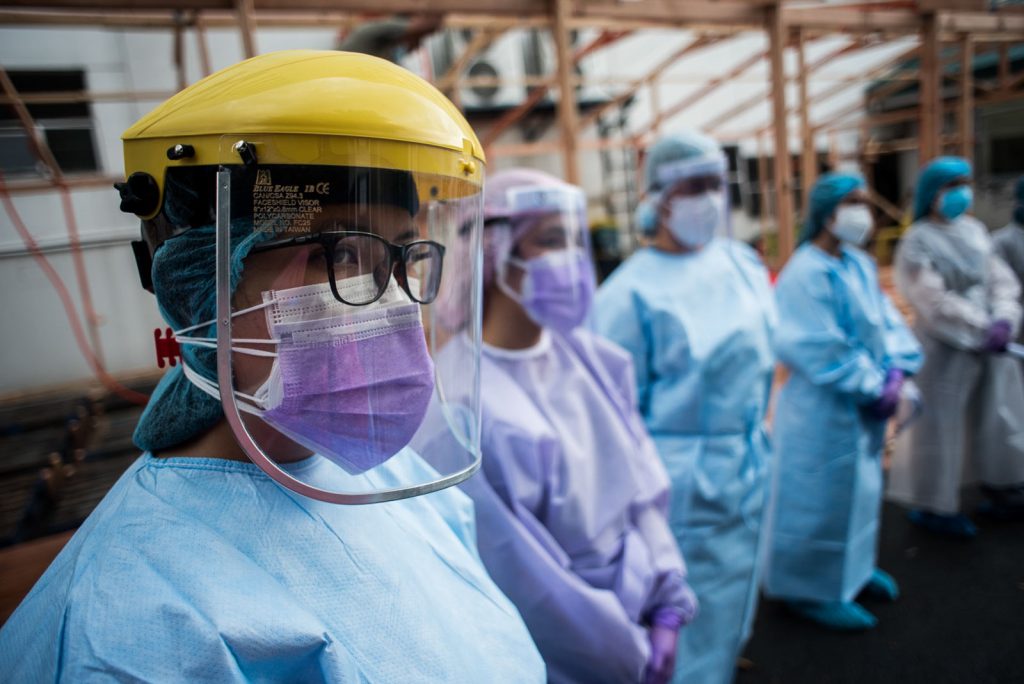
Health care workers are amazing people that perform acts of heroism every day and they are definitely one of the modern-day heroes to honor this Labor Day. On the front lines, they’re the difference between life and death for our most serious COVID-19 patients. Even when they are not fighting to save someone’s life, they’re laying their own life down for all of us. They sacrifice time with their families and sometimes their time to rest.
The mental health of medical front-liners is something to admire. They have stayed resilient and stood witness to tragic losses for the past year and a half, with loved ones of the deceased left with no choice but the option of cremation, the news of which they would have to break.
As health care workers, they deserve equal protection of their rights. And as the recipients of their care, we always should remember that we owe it to health workers everywhere to stand up for their safety.
Frontliners (Food Service Providers, Police, Military, Street Sweepers, Delivery Riders, and Farmers)

For the past year, these front liners have been at the forefront of our nation’s battle against Covid19:
– Foodservice providers – Street sweepers – Delivery riders – Military and Police personnel – Civil servants – Farmers
Let us not forget these persons who provide mostly our basic needs and of course ensures the safety of the community. Moreover, we should honor these modern-day heroes this Labor Day for putting their lives on the line and carry out their critical tasks.
Death Care Service Providers
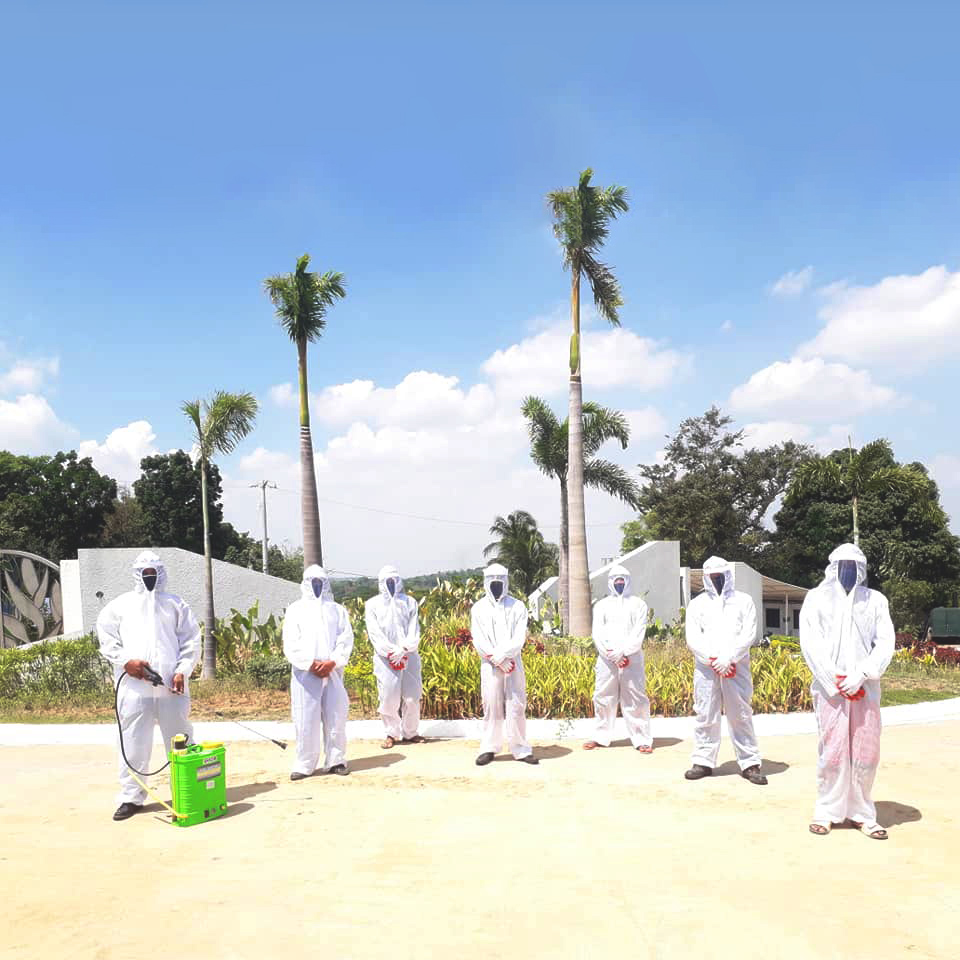
Lastly, the most forgotten modern-day heroes today are the Death Care Service Providers . Deathcare workers are also heavily impacted by the grieving process, especially during this pandemic. They are deemed “high-risk health care workers” and they fall into one of the first groups that should be vaccinated against COVID-19 At Golden Haven, our employees’ safety has always been paramount in management’s priorities, while maintaining the quality service that we provide. Know more about the services we provide here .
Golden Haven Memorial Park is a subsidiary company of publicly listed, Villar-owned Golden MV Holdings Inc., currently positioned as one of the largest real estate companies in the country. Golden Haven offers premium death care services and prime memorial lots—dubbed as the most lucrative real estate investment in the country today with an average of 20% annual value appreciation.
Be part of the Golden Haven community today! Visit goldenhaven.com.ph or follow “Golden Haven” on our social media platforms. We are on Facebook , Twitter , Instagram , YouTube , Pinterest , Spotify, Viber, Telegram, Kakao Talk, LINE and WhatsApp. For sales related inquiries, you may contact (02) 8873-2922 to 23.

Golden Haven is a member of the Villar Group of Companies and a subsidiary of Golden MV Holdings, Inc. The company continues to develop the most beautiful memorial parks in the country and is now the largest chain of memorial parks in the Philippines.
View all posts
Related Posts

- Bulacan Travel Guide: Explore on a Budget

- Side Hustles to Explore in 2024

Exploring Different Types of Real Estate Inv...
Latest listing.

- Buying Properties
- Uncategorized
Featured Stories
- Exploring Different Types of Real Estate Investments
- 5 Signs of a Good Memorial Lot Investment Opportunity
- Smart Investments for Your 20s in the Philippines
- How Memorial Parks Foster Connections
- How to Leverage Memorial Property Investments for Financial Freedom
- Investment Opportunities for OFW this 2024
Mobile Number *
Position * —Please choose an option— Marketing Assistant Technical Service Engineer Architect Accounting Assistant Credit & Collections Assistant Family Care Associate
Note: File Attachment 5mb limit.
Use the form below to contact us!
Compare Listings
Privacy overview.

Please enroll/select Golden Haven Memorial Park as biller.
Required enrollment details include:
- Company/Biller Name: Golden Haven Memorial Park
- Subscriber Number: (Client Code e.g. EZE0123456)
- Subscriber Name: (Client Name)

Follow these steps:
- Login to your AllEasy, and select “Pay Bills”
- Type “Golden Haven” in the Search Tab
- Reference Code (Sample: BAU001111)
- Client Name
- Confirm Transaction and you’re done!

- Open Maya App
- Select Bills
- Select Memorial
- Select Golden Haven Memorial Park Inc.
- Complete the Pay Bills Details
Send us a screenshot of your transaction at [email protected]

- Open GCash Application and select “Pay Bills”
- Select others in the billers section
- Choose “Golden Haven”
- Fill in required field
For inquiries, email us at [email protected]
Thank you for submitting your Reservation Form! You may now proceed to the payment.
The assigned Digital Marketing head will contact you regarding your orientation. Follow us on our official social media pages to get updates.
Please check your email for the details. Follow us on our official social media pages to get updates.

- Doctors Loan
- Car Financing Loan
- Truck Financing Loan
- Sangla Titulo for Business Owners
- Loan Calculator
OFWs, Our Modern-day Heroes
Sep 13, 2019

OFWs or Overseas Filipino Workers are considered by many people (in the Philippines and worldwide) as modern-day heroes – and they have good reason to do so. Not only do OFWs face various forms of hardships while working abroad, but they also help a lot in sustaining the Philippines’ economy. Still, if you can’t take our word for it, then allow the reasons below to change your mind.
They Endure Not Being With Their Families
Filipinos are willing to go through hell and high water just to provide for their families. But what pains them the most is the time and distance away from their loved ones. Disconnecting from their families is the biggest sacrifice OFWs make. Not only do they have to endure homesickness, but they’ll also have to miss out on a lot of their loved ones events (Christmas celebrations, funerals, etc.).
They Constantly Deal With Homesickness
Homesickness and loneliness are also struggles among OFWs. even with high pay and good working conditions, working abroad can take its emotional toll on our kababayans. This is especially the case for first-timers and young OFWs, who venture out of the country without knowing how painful it is to live away from loved ones in a foreign country.
They Brave Poor Working Conditions
Global Pinoys are some of the toughest people you’ll ever meet. To financially make ends meet for their loved ones, they are willing to brave harsh working conditions, long hours of labor, and even low wages.
They Provide Strong Remittance Inflows
Aside from securing the basic needs of their own families, remittances sent by OFWs contribute a lot to boost the Philippines’ economy. For one thing, it helps keep the country afloat whenever there’s a global financial crisis due to its liquidity. Remittances also play a significant role in alleviating poverty in the archipelago, as well as creating stable cash flow and circulation for its various infrastructures.
They Face Uncertainty Abroad
Lastly, OFWs work hard abroad without knowing what lies ahead and what risk awaits them. Even today, it’s not uncommon to hear news of our kababayans being abused and molested by harsh foreign land-based or sea-based employers. There are even cases where OFWs return to the country and their loved ones in body bags (due to harsh working conditions and acts of terrorism).
Honor Our Kababayans
As you can see, OFWs deserve every ounce of our respect for the sacrifices they’ve made and the hardships they’ve endured. So better salute them for the heroes and martyrs they truly are.
Related Posts
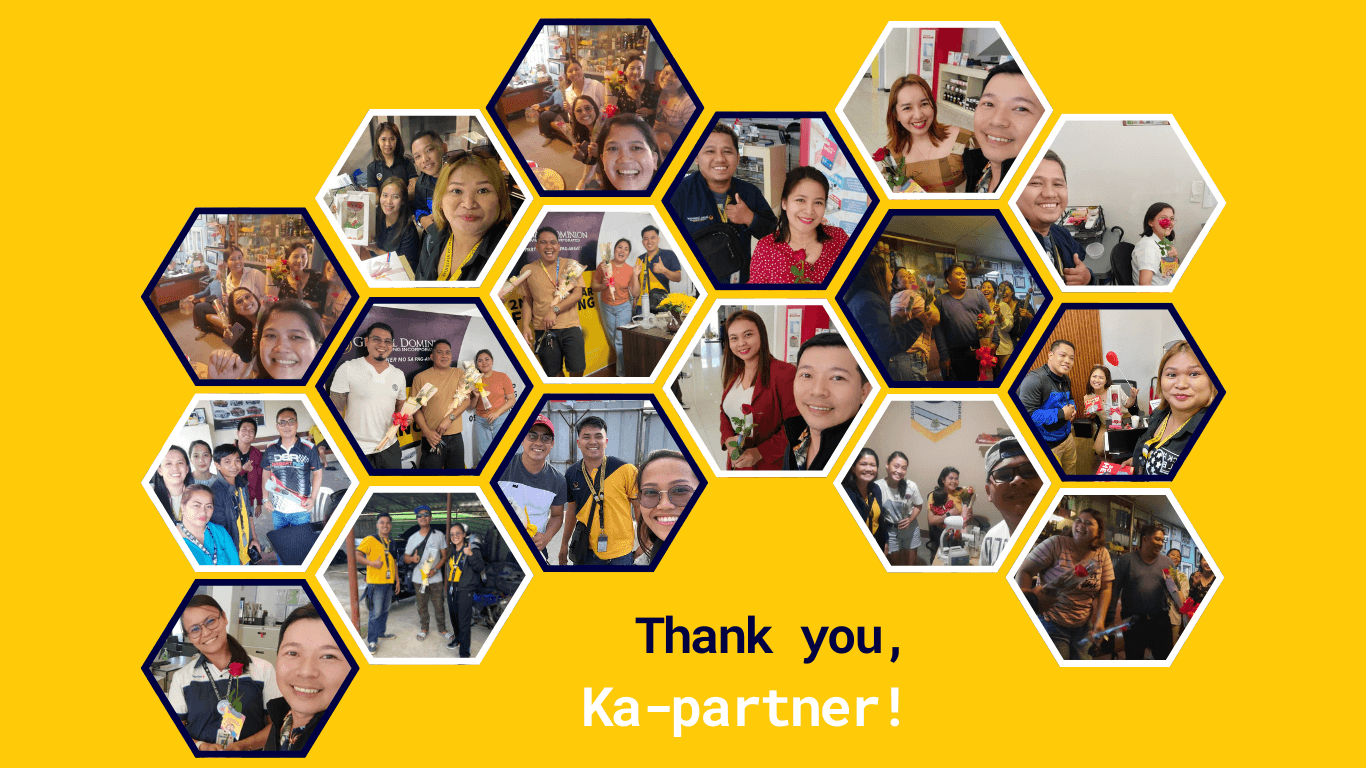
By: Jay Ann Bonghanoy
Global Dominion Spreads Love and Appreciation to its Partner Car Dealers
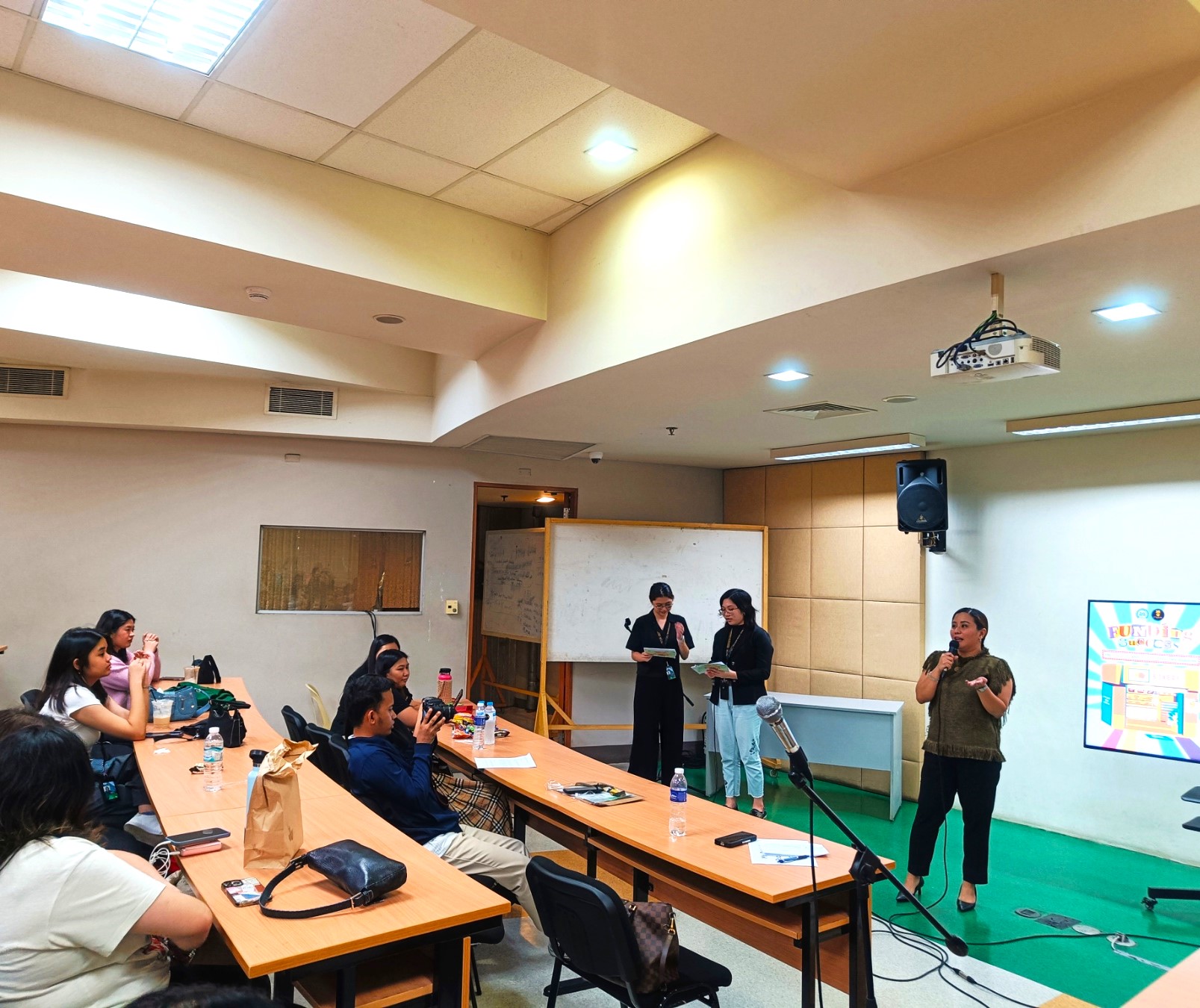
By: Paulo Abad
GDFI News – February 2024

Global Dominion Pushes For Inclusive Training Programs For Businessmen

Global Dominion joined SB Finance and Mount Fuji Lending in FPH’s first Financing and Lending Forum
Sorry, this type of loan is not what suits you best. visit our list of loan products here..
Advertisement
Supported by
A Novelist Comes Home to Bury Her Words, and Brings Them Back to Life
In Julia Alvarez’s “The Cemetery of Untold Stories,” a boneyard in the Dominican Republic becomes a rich wellspring for discarded narratives.
- Share full article

By Luis Alberto Urrea
Luis Alberto Urrea’s most recent novel is “Good Night, Irene.”
THE CEMETERY OF UNTOLD STORIES , by Julia Alvarez
The best stories live within us long after the final word; characters and places continue beyond the lines on a page. Yet the image of all the unfinished, unsatisfying, impossible stories we leave in our wakes haunts the writer as well as the reader. And with more than 20 books published across a three-decade career, no one may be haunted more than Julia Alvarez.
The hero of Alvarez’s seventh novel, Alma Cruz, is a writer from the Dominican Republic who has come to the United States and created a literary life, beginning with critically acclaimed books about the motherland and evolving into a chronicler of life in the U.S.A. (Longtime readers of Alvarez’s work will recognize her own trajectory, from her early classics like “How the García Girls Lost Their Accents” and “In the Time of the Butterflies” through poetry, memoir, children’s books and more.)
The famous author has always wrestled shadow and sunlight, laughter and agony, into tales that sometimes felt like ghost stories. Readers knew to seek the truths behind the narrative — to find sorrow in the funniest scenes, or the unexpected outburst of joy in a somber one. Of course, I am speaking about Alma Cruz. (But also, Julia Alvarez.)
One day, Alma decides she has had enough with the fame game, the big career and its ups and downs. She comes to a lovely conclusion: It is time to return to the homeland she fled, and she will take all the drafts of her unfinished or unpublished books and lay them to rest there, giving each a proper burial. She buys a plot of land and begins to build a graveyard.
The locals become a fantastic choir of curious, suspicious, baffled neighbors: One rumor has it that “the place will be a resort, which would provide employment for maids, gardeners, waiters, cooks, watchmen”; another imagines “a grand house, complete with a swimming pool, a tennis court, a mini putting green.” Still another posits, “A baseball academy would be a dream come true for the tigueritos roaming the streets. Keep them out of trouble.” But when they realize Alma is building a graveyard, the outburst is comedic: a cemetery! Fear of zombies immediately clashes with the fear of homeless people defecating in mausoleums — and what kinds of jobs, by the way, are there in a boneyard? They have more reckoning to do when they realize Alma intends to put her stories in the ground, literally.
Word goes out that the great author has returned, and the locals flock to her like butterflies, everyone eager to share. A festival of storytelling breaks out in the tropics. Are the neighbors hoping to bury their own or are they giving life to tales untold? No matter. Rumors and gossip, histories and familial dramas swirl around Alma. “A little bird told me. Había una vez. Cuentan los viejos. Some scandal on the news, who is sleeping with whom, what fulano has done or said to fulana, a juicy chisme, a hot rumor. …” Amid the chatter, Alma’s own stories, the ones she has come home to bury, somehow find their place.
Soon Alma is meeting with architects, and more characters join in the cumbia of story — the dueling Perla and Filomena, who have not spoken for 30 years but keep each other’s phone numbers just in case. It is a shadowy feud, of course: “Way back, Filomena destroyed Perla’s peace of mind. The story has been buried so deep, it should have rotted into oblivion. But like Lazarus in la Biblia, it keeps coming back to life.”
Indeed. Here comes the fabulous Bienvenida (it means “Welcome”), with her tragic history that Alma cannot resist. She was once, you see, the wife of the dictator, Trujillo, a loyal and devoted first lady who is cast aside when she is unable to produce an heir. Eventually, El Jefe falls for the charms of another woman — “jealous and possessive, with a will equal to his own” — and Bienvenida’s “death knell comes when this mistress gives birth to a son.”
Men and boys, too, join in with their dramas and secrets, pride and regrets. As voices and stories are set free, it feels like a carnival, a festival. Alma’s first-person voice is jostled. We do not care; we are already in the warm sun and the sea wind and the cooking smells and the music of the dance.
As the book accelerates, the characters seem to become their own novelists. They rewrite their lives, they revise their histories, they reinvent their ongoing myths even as Alma is planning to bury her own stories in their troubled, sacred earth. Only an alchemist as wise and sure as Alvarez could swirl the elements of folklore and the flavor of magical realism around her modern prose and make it all sing.
The camino that “The Cemetery of Untold Stories” travels — from Vermont to the Dominican Republic, from literary fame to chosen retreat, from modern American writing to a profoundly Latin American tone — is lively, joyous, full of modern details and old tall tales. Any reader with roots and ancestors in other lands lives in a multiple-narrative story, one that we try to share with everyone, though we have to translate it. Yet we also go back to the ancestral home, and find ourselves translating our Yanqui life as well. Which story is the truest?
This often witty, occasionally somber and elegiac novel begins with a simple exhortation, in English: “Tell me a story.” It ends on a melancholy and evocative note. Spoiler alert: Another single line, this time in Spanish after the last page concludes, announces, “Este cuento se ha acabado.” (This story has ended.) A definitive slam of the door.
THE CEMETERY OF UNTOLD STORIES | By Julia Alvarez | Algonquin | 256 pp. | $28
Explore More in Books
Want to know about the best books to read and the latest news start here..
James McBride’s novel sold a million copies, and he isn’t sure how he feels about that, as he considers the critical and commercial success of “The Heaven & Earth Grocery Store.”
How did gender become a scary word? Judith Butler, the theorist who got us talking about the subject , has answers.
You never know what’s going to go wrong in these graphic novels, where Circus tigers, giant spiders, shifting borders and motherhood all threaten to end life as we know it .
When the author Tommy Orange received an impassioned email from a teacher in the Bronx, he dropped everything to visit the students who inspired it.
Do you want to be a better reader? Here’s some helpful advice to show you how to get the most out of your literary endeavor .
Each week, top authors and critics join the Book Review’s podcast to talk about the latest news in the literary world. Listen here .

IMAGES
VIDEO
COMMENTS
Overseas Filipino Workers (OFWs) is a term referring to Filipino migrant workers, individuals who have left their homes to work abroad and provide comfortable lives for their families. Referring to these workers, former President Corazon Aquino coined the phrase 'Bagong-Bayani' in 1988. OFWs are the country's modern-day heroes because ...
Why OFWs are modern day heroes. OFWs provide strong remittance inflows. OFWs are often employed in poor working conditions. OFWs suffer from separation away from family. OFWs endure the unhealthy effect of loneliness and homesickness. OFWs give up the value of 'family' to make a living. Working abroad is a big sacrifice.
The Philippine Overseas Employment Administration (POEA) plays a vital role in managing foreign labor migration, ensuring the welfare of Overseas Filipino Workers (OFWs). Additionally, the government has recognized the need for further oversight, leading to the creation of the Department of Migrant Workers, which is set to be operational by 2023.
The local street sweepers who keep the streets clean of trash. The soldiers who, with or without you knowing, are always on the watch for security threats and keep them at bay. The doctors, who, even with lack of sleep, tirelessly save lives. The teachers, who offer their time unconditionally to nurture their students.
Before we can say that OFWs work in other countries just to have a better life for them, let's take a look as to why OFWs are known as 'modern day heroes': According to an article entitled 9 Reasons Why OFWs are Considered as Heroes of Modern Day on a website called OFW Update, they give 10% to the Philippines' GDP through money ...
This essay seeks to trace the relevant national and global contexts from which the bagong bayani discourse of OFWs emerged. It does so by discussing the evolution of labor out-migration in the Philippines from its beginnings in the colonial times, to overseas employment's institutionalization in the Labor Code of 1974, until the ...
Ironically, the labor and sacrifice of the overseas Filipino workers (OFWs) have also considerably improved the lives of our countrymen, and have brought some sense of economic security and well-being to our nation. OFWs are indeed the country's modern heroes. Their work overseas has greatly helped reduce poverty and played a major part in ...
OFWs as modern-day heroes: Seriously? Jul 10, 2016 12:15 PM PHT. Analiza Perez-amurao. Faced with all sorts of imaginable and unimaginable migratory experiences, beyond the votes that they cast ...
Garcia, Ma. Victoria C., "The Overseas Filipino Workers' (OFW) Identity: Local Modern Day Heroes or Global Servants?" (2004). Capstone Collection. 1658. Migration has become a common demographic response of Filipinos to various socio-economic problems. In the light of the severe economic crisis that has confronted the country in recent years ...
In the Philippines, the acronym OFW is synonymous to " bagong bayani " (modern-day heroes) particularly attributed to their contribution to the country's economy despite personal sacrifices ...
Another Twitter user,an OFW himself who is based in Thailand and uses the handle @eMCee_sadt went on and listed what he believes to be the reason for the migrant workers' 'hero' title. As af as I can remember during my college days… A thread! 1. OFWs are modern day heroes because they contribute to the country's GDP by about 10% ...
According to the. 10. Philippine Overseas Employ-ment Administration (POEA), the total deployment of overseas Filipino workers (OFWs) in 2004 hit a historic high of 933,588 - up by 7.6 percent from the 867,969 recorded in 2003.4 This significant increase was fuelled by the deployment of land-based workers which increased by 8.1 percent ...
Celebrated nationally as "modern-day heroes," the remittances from this huge Diaspora have emerged as a major source of the country's foreign exchange inflows, averaging 8.9 percent of gross national product (GNP) over the last five years and over 23 percent of export earnings.
The 330 or 39% of the total number of respo ndents have a monthl y salary of. 20,001 - 40,000 pesos, followed by Overseas Filipino Workers who have a salary. of 0 - 20,000 pesos which represents ...
Semantic Scholar extracted view of "The Overseas Filipino Workers' (OFW) Identity: Local Modern Day Heroes or Global Servants?" by M. A. García
OFWs as Modern Day Heroes. In a report by the Philippine Statistics Authority (PSA) published on March 7, 2022, there is an estimate of 1.77 million Filipinos working abroad from April to September of 2020. From this number, a whopping 96.4% or about 1.77 million are overseas contract workers, or those with active employment contracts.
Thinking of My Father, the OFW, and the Tragedy of Being 'Modern-Day Heroes'. The sad truths of the Filipino diaspora through my dad's OFW experience. My father turns 60 this year, and for most of his life, he was away fighting somebody else's battles. Much like the millions of other overseas Filipino workers (OFWs), my old man spent his best ...
National Heroes' Day 2021, A Tribute to OFWs. If there is a remarkable thing about being a Filipino, it would be the immensity of love for our family. Among all the things in their priority list, family always takes the top spot. Every sacrifice they make is a sacrifice made for our families. Even if it sometimes means leaving the country.
For decades, inflows from OFWs have become one of the domestic economy's growth operators. Overseas Filipino Workers (OFWs) are considered to be modern-day heroes all over the Philippines. Their jobs in other foreign countries have significantly reduced poverty and played an important role in transforming our once-struggling financial sector ...
Abstract. This essay seeks to trace the relevant national and global contexts from which the bagong bayani discourse of OFWs emerged. It does so by discussing the evolution of labor out-migration in the Philippines from its beginnings in the colonial times, to overseas employment's institutionalization in the Labor Code of 1974, until the administration of President Corazon Cojuangco-Aquino.
Photo by Lisa Marie David/Rappler. Health care workers are amazing people that perform acts of heroism every day and they are definitely one of the modern-day heroes to honor this Labor Day. On the front lines, they're the difference between life and death for our most serious COVID-19 patients. Even when they are not fighting to save someone ...
OFW Published. Sep 13, 2019. Share this. OFWs or Overseas Filipino Workers are considered by many people (in the Philippines and worldwide) as modern-day heroes - and they have good reason to do so. Not only do OFWs face various forms of hardships while working abroad, but they also help a lot in sustaining the Philippines' economy. ...
The National Task Force (NTF) Against Covid-19 also honored the medical front-liners as modern day heroes for "every conceivable sacrifice" they make to ensure health and safety of the Filipino people against coronavirus. "For the past six months, our doctors, nurses, military and police personnel and civil servants have been at the ...
The best stories live within us long after the final word; characters and places continue beyond the lines on a page. Yet the image of all the unfinished, unsatisfying, impossible stories we leave ...